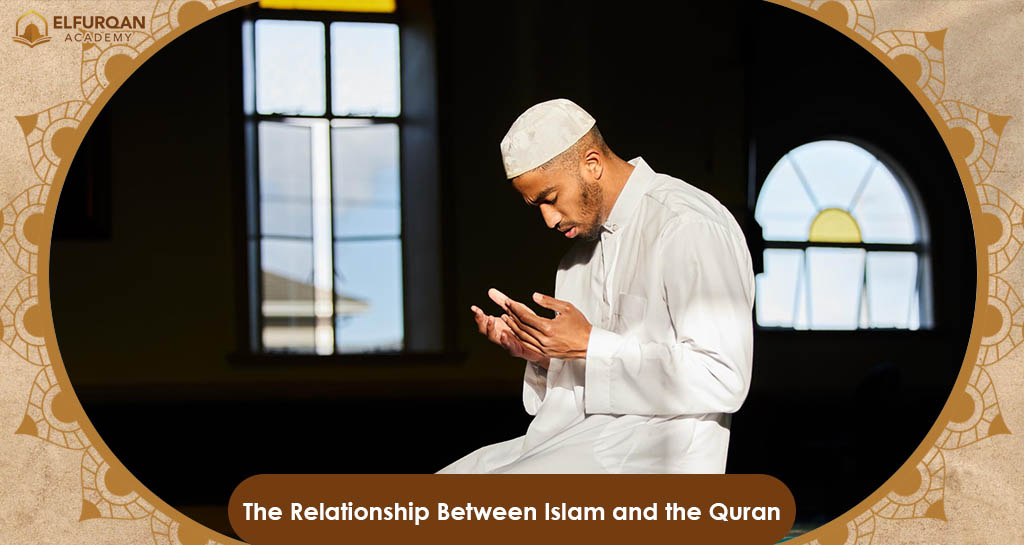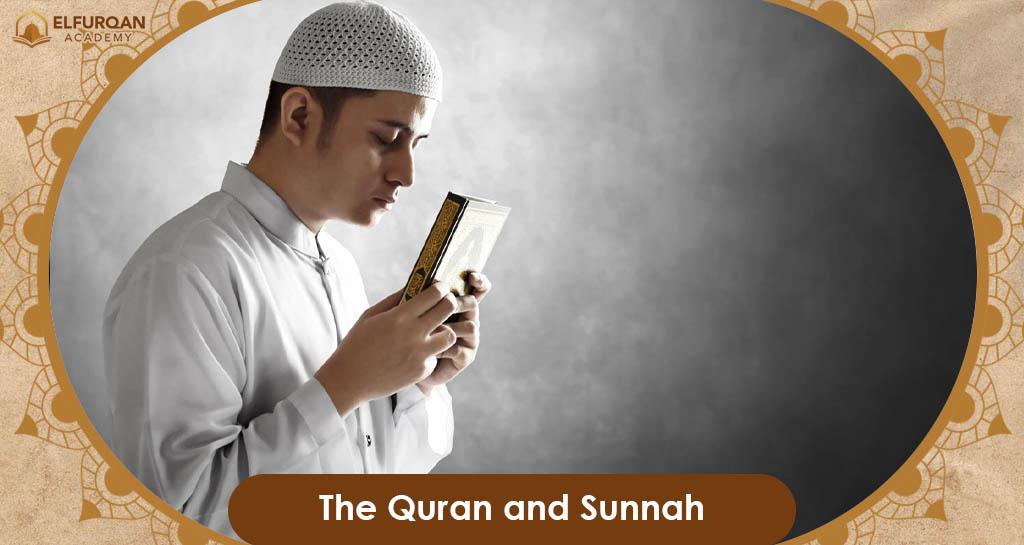islam and the Quran are inseparable foundations of a Muslim’s faith, guiding believers in every aspect of life. The Quran, revealed to Prophet Muhammad (Peace Be Upon Him), serves as the ultimate source of divine wisdom, while Islam provides the framework for living according to its teachings.
At EL-Furqan Academy, we are dedicated to helping students worldwide understand the Quran deeply—its recitation, meaning, and application in daily life. Through expert-led online classes, we combine traditional scholarship with modern teaching methods, empowering learners to strengthen their spiritual connection and live by the timeless guidance of Allah’s words.
The Relationship Between Islam and the Quran

Islam and the Quran stand together as the ultimate source of divine guidance for humanity. The Quran, revealed by Almighty Allah to the Prophet Muhammad ﷺ, is the eternal light that leads mankind out of the darkness of ignorance, falsehood, and superstition into the brilliance of truth, faith, and divine wisdom. Unlike previous scriptures that have been altered or lost, the Quran remains perfectly preserved, serving as the pure connection between humanity and their Creator, Master, and Sustainer.
In Islam and the Quran, the relationship between a believer and Allah is direct—no intermediaries are needed. A single verse from the Quran, a sincere moment of reflection, or a heartfelt supplication is enough to bring a person closer to their Lord. This reflects the heart of Islam’s message: the ultimate purpose of life is to worship and serve Allah (Qur’an 51:56). Yet in Islam, worship extends far beyond rituals; it embraces the entire way a Muslim lives—as Allah’s representative on earth—aligning every action, thought, and intention with His divine will.
Islam and the Quran present more than just a religion in the narrow sense; they form a complete way of life, uniting faith, worship, culture, and civilization under the principle of tawhid—the oneness of Allah. Just as Allah is One, truth is one, and the purpose of human life is one. The Quran is not only a book to be recited; it is the foundation of Islamic thought, morality, and civilization, guiding every aspect of life—spiritual and material—toward the pleasure of Allah.
EL-Furqan Academy – Illuminate Your Path with the Quran
Unlock the timeless wisdom of the Muslim Quran with EL-Furqan Academy. Our expert-led online courses in recitation, Tajweed, memorization, and Tafseer are tailored for learners at every level. Whether you’re just beginning or striving for deeper spiritual connection, our certified instructors will guide you every step of the way—right from the comfort of your home.
Don’t wait to transform your understanding of Allah’s word into heartfelt practice and profound peace.
Enroll now with EL-Furqan Academy and start your journey toward embracing the Quran’s light in your life today.

Islamic Teachings in the Quran
Islam and the Quran—two inseparable foundations of the Muslim faith—represent the divine guidance revealed by Allah to the Prophet Muhammad ﷺ. Islam, meaning “peace and submission” in Arabic, calls believers to attain true peace by surrendering their will entirely to Allah. Those who follow this path and live according to its divine laws are known as Muslims. The Quran, as the central scripture of Islam, is not only a holy book but also a complete code of life, providing guidance for every aspect of human existence.
Islam and the Quran together define the essential principles of belief, including the Articles of Faith and the Five Pillars, while offering broader guidance that shapes a Muslim’s moral, social, and spiritual life. The Quran also highlights the mission of the Prophet Muhammad ﷺ, who delivered Allah’s final revelation, and unites the Muslim community despite its different sects. As one studies Islam and the Quran in depth, they encounter precise Arabic terms and concepts that carry profound meanings and timeless wisdom.
At the heart of Islam and the Quran lies the purpose of human creation, expressed in the divine words:
“And I have not created the jinn and mankind except that they may worship Me.” (Quran 51:56)
In Islam, the foremost duty—Haqu-Allah—is devotion to Allah through worship, obedience, and sincere love. This devotion extends beyond rituals, guiding every action in life. The second duty—Haqul-Ibaad—is serving humanity, for compassion toward creation reflects love for the Creator. Thus, Islam and the Quran combine faith, worship, and ethics, offering not merely a religion of rituals but a complete way of life built on peace, justice, and mercy.
The Quran in Islamic Life
The Quran is far more than a book—it is the eternal word of God and the ultimate source of truth and guidance for all humanity.
Muslims believe it was revealed in the Arabic language to the final prophet and messenger, Muhammad ﷺ, as a direct communication from the Creator. Its words carry divine authority, clarified and exemplified by the teachings and actions of the Prophet ﷺ.
In Islamic life, the Quran is experienced in two primary ways: as Quran (recital), when it is recited aloud, and as Kitab (writ), when it is read from its written form.
Both forms serve as powerful connections to God’s message. Known also as Kalam Allah (Divine Speech), the Quran holds the highest position in guiding personal conduct, community ethics, and societal values.
The Quran describes itself as Dhikr (remembrance) and Huda (guidance), reminding believers to keep God present in their hearts and minds while offering a complete framework for righteous living.
It is the final revelation, confirming and completing the messages of earlier prophets such as Adam, Noah, Abraham, Moses, and Jesus (peace be upon them all). Unlike previous scriptures, it has been divinely preserved, remaining unchanged since its revelation, and will continue to guide humanity until the Day of Judgment.
Learn more: Quran teachers
Islamic Quran Studies
The Qur’an is the ultimate source of divine guidance, but to truly grasp its intended meanings and apply them in life, one must engage in Tafseer—the science of explaining and interpreting the Qur’an. While the Qur’an itself declares, “Verily, this Qur’an guides to that which is most right” (17:9) and “We have sent down to you the Book as an explanation for everything, a guidance, a mercy, and glad tidings for the Muslims” (16:89), understanding its depth requires more than a literal reading.
Importance of Tafseer (Quranic interpretation)
Tafseer acts as the key that unlocks the treasure of the Qur’an, allowing believers to access its full wisdom and implement its guidance in daily life. Scholars trained in Tafseer can derive precise meanings, rulings, and lessons from its verses, something that an untrained reader may miss. As Shaykh Yasir Qadhi explains, “The Qur’an is like a treasure trapped in a glass receptacle; mankind can view and benefit from this treasure, but they need Tafseer to unlock it and benefit to the greatest extent.”
The purpose of Tafseer is to:
-
Clarify the perfect beliefs about the Creator and the relationship between creation and Creator.
-
Refine personal conduct and cultivate high moral standards.
-
Establish laws and ethical codes for family and personal life.
-
Provide social and political guidance for communities and nations.
-
Narrate the histories of past nations—offering role models for the righteous and warnings from the fate of the misguided.
-
Give glad tidings of Paradise to the believers and warn of Hell for the disbelievers.
-
Demonstrate the truthfulness of the Prophet ﷺ through the miraculous nature of the Qur’an.
There are three primary types of Tafseer:
-
Tafsir bi-l-Riwaya – Interpretation through transmitted knowledge, including Qur’an explaining Qur’an and explanations from the Prophet ﷺ and his companions.
-
Tafsir bi-l-Ra’y – Interpretation through sound reasoning and knowledge, not solely based on past narrations.
-
Tafsir bi-l-Ishara – Interpretation by deeper indications and conceptual insights derived from the text.
Ultimately, Tafseer is essential for fulfilling the purpose of human life: worshiping Allah in the way He commands. Without proper understanding, worship may be incomplete. Thus, Islamic Qur’an studies go beyond translation—they seek the true essence of the divine message, guiding both faith and action in every sphere of life.
Read also: islamic words
The Quran and Sunnah

In Islam, the Qur’an and the Sunnah together form the two primary sources of guidance and law. The Qur’an is the divine revelation from Allah, while the Sunnah represents the recorded words, actions, and approvals of the Prophet Muhammad ﷺ, preserved in the Hadith. Alongside the Qur’an, the Sunnah serves as a foundational source of Shari’ah (Islamic law), shaping the beliefs, practices, and moral conduct of the Muslim community.
Before Islam, the term sunnah in Arabian culture referred to the established customs and precedents of tribes, passed down from ancestors and accepted by the community. In the early Islamic period, there was some variation in how Muslims understood their Sunnah
some following the practices of the people of Madinah, others adhering to the ways of the Prophet’s companions, and still others developing local legal traditions. This diversity was unified in the late 8th century by the renowned scholar Imam al-Shafi‘i (767–820 CE), who established that the Prophet’s Sunnah, authentically preserved in the Hadith, holds normative and legal authority second only to the Qur’an.
The authority of the Sunnah was reinforced when scholars developed ‘Ilm al-Hadith—the rigorous science of verifying the authenticity of Hadith—to protect against fabricated reports driven by political or sectarian motives. Through this scholarly discipline, only reliable narrations were accepted as true representations of the Prophet’s teachings.
In Islamic scholarship, the Sunnah plays a vital role in:
- Tafseer (Qur’anic exegesis): Clarifying and elaborating on verses of the Qur’an.
- Fiqh (Islamic jurisprudence): Providing rulings on matters not explicitly addressed in the Qur’an.
Together, the Qur’an and Sunnah form a complete framework for Islamic faith and practice. The Qur’an provides the divine message, and the Sunnah demonstrates its living example—guiding Muslims in belief, worship, law, and daily conduct.
In conclusion, islam and the quran offer a complete guide for living a life rooted in faith, morality, and purpose. The Quran’s timeless wisdom, paired with the principles of Islam, continues to inspire and transform lives across the globe. At EL-Furqan Academy, our mission is to help every learner connect with the Quran on a deeper level—understanding its meanings, applying its teachings, and embodying its values. Begin your journey today and let the light of the Quran illuminate your path toward spiritual fulfillment.
Read also: islamic studies
